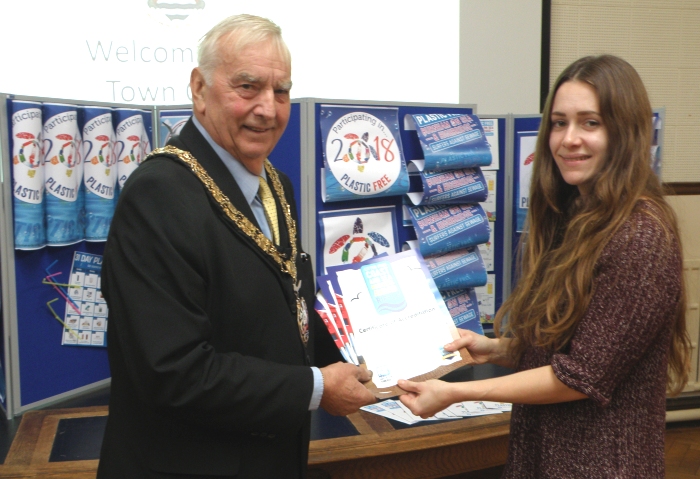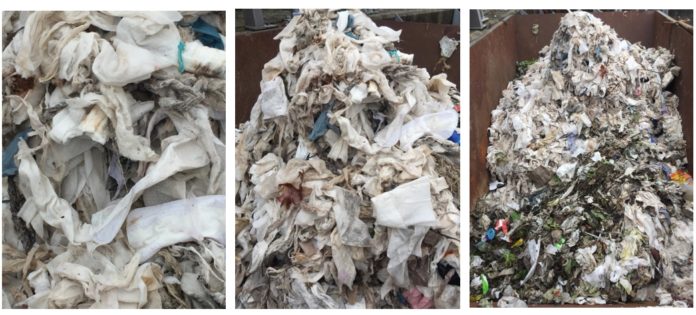Large numbers of wet wipes and fats that are being flushed down toilets and drains in Burnham-On-Sea and Highbridge threaten to create a ‘fatberg’ that could block sewers underneath the town, it has emerged this week.
Litter Free Coast & Sea Somerset says it is increasingly worried about the dangers from the waste that is currently disposed of.
These photos at Highbridge Waste Water Treatment Plant show the wet wipes and rags that are regularly collected from local waste water.
Chloé Walker-Panse of Litter Free Coast & Sea Somerset, pictured below with the Mayor, Cllr Bill Hancock, told Burnham-On-Sea.com: “Fatbergs form when fats mix with solid items such as wet wipes in the sewer system due to fats being poured down drains and objects being flushed down toilets.”
“They congeal together and form a hard mass. As time goes on, they get bigger and bigger.”

“Eventually, they become so large that they block sewers completely, causing raw sewage to overflow the system and spill out onto streets and potentially into the river and sea, negatively impacting on bathing water quality.”
She adds: “Sidmouth recently suffered from this problem and it has many similarities with Burnham, in that it is a small seaside town with shops and cafes, relying heavily on tourism.”
“The fatberg at Sidmouth was found under the Esplanade, just metres from the sea. This could easily be The Esplanade at Burnham so let’s not feed a Somerset fatberg.”
Burnham-on-Sea MP James Heappey has responded to the concerns raised by Litter Free Coast and Sea Somerset.
He said: “So much good work has gone in to improving bathing water quality in Burnham-on-Sea but there is still a great deal left to do. Wessex Water, Natural England and the Environment Agency have all got important roles to play, but it is essential that those of us who live near the coast understand that we must change our ways too.”
“Wet wipes, sanitary products, condoms and nappies cannot be flushed down the loo, nor should fats and oils be poured down the kitchen sink as they cause blockages in the sewers and lead to storm overflows, discharging sewage directly into the sea.”
The MP adds: “I’ll continue to attend the Bathing Water Steering Group and work with local stakeholders to make sure that Burnham’s water quality gets back to where it should be.”
How can residents reduce the risk of a ‘fatberg’ forming?
Chloe explains: “The two main practices that individuals need to change in their homes are what they pour down the sink, and what they flush down the toilet. It’s as simple and easy as that!”
“Fats, oils and greases are one of the issues that we campaign on, urging people to dispose of them correctly. Solid fats, plate scrapings, food waste and paper kitchen towel – from wiping out a frying pan before cleaning – should be put in your food waste bin, once cool. This goes on to be used at Somerset anaerobic digestion plant to generate electricity and form compost.”
“Again, all liquid cooking oils can be recycled at any recycling site. Once the oil is cool, pour it into an old container and take it to your nearest recycling centre, where you can pour the contents into the cooking oil tank, and recycle the container. The oils are then used to generate heat and power.”
“Remember, never pour solid or liquid fats down the sink or mix them into your rubbish.”
She adds: “The other issue we campaign on is only flushing the 3 P’s (pee, poo and paper) down the toilet to keep pipes blockage free. Despite what you may have heard, it is important to remember that the so-called ‘dirty dozen’ are not flushable and can end up in our oceans in times of heavy rainfall or if they escape from wastewater treatment plants.”
“By placing bins in our bathrooms and consciously changing our habits by avoiding disposable items and opting for reusable alternatives wherever possible, this will lessen the risk of these items polluting our coastline.”
“As part of our Burnham-On-Sea Business Awards Scheme, we are working with and supporting local businesses to uphold these actions by displaying our ‘love your loo’ posters in the customer toilets, installing grease separators and strainers for sinks and training staff on the correct disposal of FOGs.”







